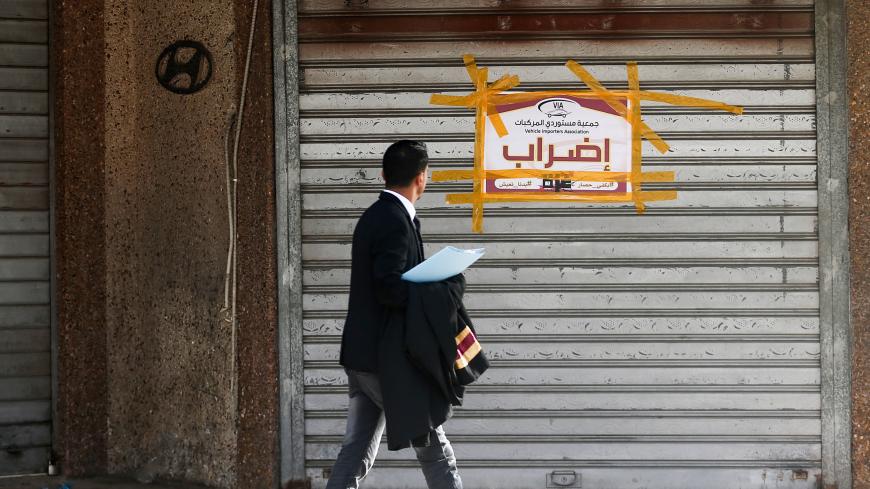The private sector in the Gaza Strip announced unilaterally Jan. 28 to cease the coordination of the entrance of goods through the Karem Abu Salem crossing for one day, on Feb. 6. The crossing was practically shut down on that day because Palestinian traders and businesses in Gaza refused to receive incoming goods. This move is intended to protest the sharply deteriorating economic conditions in Gaza, especially in recent months.
Businesses in Gaza are forced to shut down due to the extremely low purchasing power of its customers, as a result of the Israeli blockade since 2007, which rendered Gaza’s economy virtually dead and stagnant, and three Israeli wars on Gaza, along with the imposed punitive measures by President Mahmoud Abbas against the Gaza Strip to pressure Hamas to give up power. After all, how will there be purchasing power in a place where the unemployment rate stands at 43.9% and where 58% of young people are unemployed.
In a similar move, the private sector declared Jan. 22 a general strike for one day (Jan. 22) to protest the worsening economic crisis that is disastrously reaching Gaza society on all levels.
Raed Fattouh, the chairman of the coordination committee for the entry of goods into the Gaza Strip, told Al-Monitor, “The number of trucks entering through Karem Abu Salem has declined sharply in recent months. In the past, the number used to be between 800 and 1,000 trucks a day — now it is 300 to 350 a day. All of this is due to the low purchasing power of Gazans.”
This situation has forced traders in Gaza to buy less than half of what they used to buy a couple of years ago. Otherwise, they are risking either the corruption of their goods or selling these goods at a loss.
Al-Monitor came across several incidents in the last two weeks alone, where distributors are selling their goods at around half the price to retailers. Yasser, a distributor, told Al-Monitor, “It’s either that or they will remain forever in my store.”
A lot of businesses have shut down in recent months. Akram Mourad, who owns a shoe store in the center of Shati refugee camp market, which is one of the best shopping spots in Gaza City for sellers, closed his business in January. He told Al-Monitor, “Even though I was in the center of the market, I felt like I was in a desert. Rarely did customers come to my store, and when they did, they often wanted the items at half the price — a price that constitutes a loss for me.”
He added, “There’s no balance; the price that customers can afford is a price that is a business killer.”
Al-Monitor came across a fruit store in al-Rimal, which is also a popular area. Shopkeeper Ahmed Omer pointed to his store and said, “All of this is a waste of my time. It doesn’t earn me enough for even half of my family. The people here can barely buy the necessities nowadays. They’re not going to buy my fruits.”
Yedioth Ahronoth, a center-left Israeli newspaper, reported Jan. 28 that the number of trucks entering the enclave has reached a record low of 325 a day compared to 800-1,000 trucks a day in the past. The paper expressed concern that the extreme deterioration of economic and living conditions in Gaza might have a serious blowback on the security of Israel.
The private sector has acted for years as the safety valve for the coastal enclave; it provides 65% of the jobs, according to Gaza’s head of the Chamber of Commerce Maher al-Tabaa. The collapse of the private sector will totally freeze the economy, which will bring about unexpected repercussions on the people of Gaza.
On Jan. 25, the Charity Coalition, an umbrella organization for Islamic charity groups in the Gaza Strip, launched a campaign titled “Save Gaza.” The coalition coordinator, Ahmed al-Kurd, said at the launching press conference in Gaza City that the Gaza Strip has become a “disaster zone” and called for immediate action to rescue its inhabitants. He called on all international institutions to urgently intervene without any delay or procrastination to end the siege and meet the basic needs of Gaza’s 2 million inhabitants.
According to Kurd, 80% of the factories have closed either completely or partially. Moreover, the Gaza Strip suffers direct or indirect losses of $250 million annually.
Kurd said that 80% of Gaza’s population lives in poverty — 65% of whom live below the poverty line, while three-quarters of the population needs urgent relief aid that is no longer available.
This campaign was launched days after the US State Department’s announcement Jan. 16 that it is withholding $65 million of the originally planned $125 million funding installment for the United Nations Relief and Works Agency for Palestine Refugees in the Near East that provides basic needs such as food, education and health services.
There seems to be unilateral agreement among Palestinians in Gaza that the situation in the Gaza Strip has hit rock bottom. Several residents in their 60s told Al-Monitor the same: “We have never experienced anything remotely like this.”
Palestinians in Gaza are often called resilient, but their resilience has run out years ago; the people of Gaza can no longer handle the current conditions. The situation in the Gaza Strip is unlivable, and it is getting significantly worse every single day.







